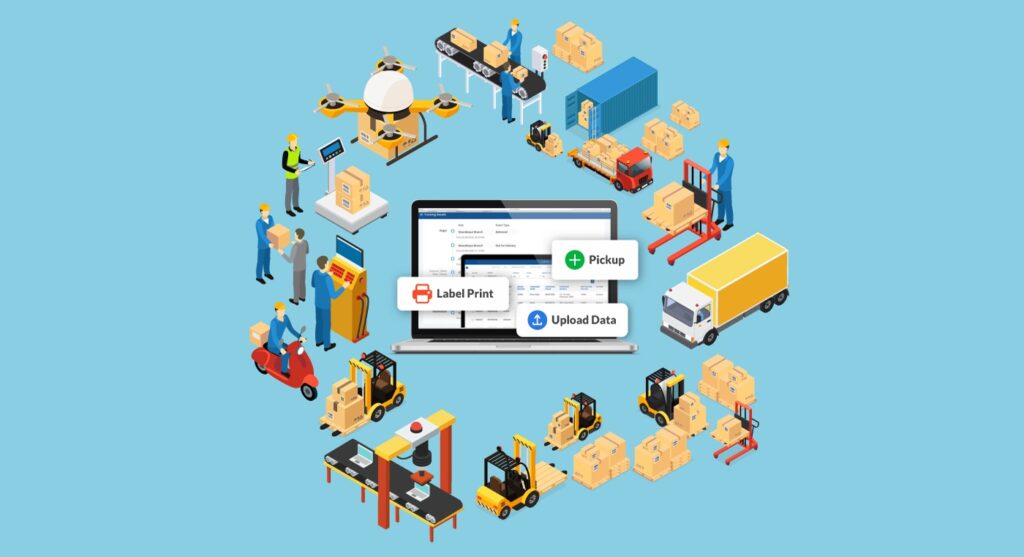
In today’s fast-paced business world, logistics and supply chain management are becoming increasingly complex. Companies are constantly looking for ways to streamline their supply chain operations, reduce costs, and increase efficiency. This is where logistics solutions come into play. By implementing effective logistics solutions, businesses can optimize their supply chain operations, improve their bottom line, and gain a competitive edge in the market.
In this blog post, we will explore the importance of logistics solutions and how they can be used to streamline your supply chain for success. From inventory management to transportation and distribution, we will cover the key areas that businesses need to focus on to ensure their supply chain operations run smoothly.
The Role of Logistics in Business
- Supply Chain Management: Logistics plays a crucial role in the management of supply chains. It encompasses the coordination and control of the flow of raw materials, components, and finished goods from suppliers to manufacturers, distributors or retailers, and ultimately to customers. By implementing efficient supply chain logistics practices, businesses can achieve cost reduction, heightened customer satisfaction, and increased competitiveness.
- Cost Reduction: Businesses can achieve considerable cost savings by implementing efficient logistics operations. By strategically planning transportation routes, keeping inventory levels low, and simplifying distribution processes, companies can effectively decrease their overall operational expenses.
- Customer Satisfaction: Ensuring the prompt delivery of products is crucial in maintaining customer satisfaction. The field of logistics plays a vital role in ensuring that products are readily available at the right time and place, thereby fostering increased customer loyalty and recurrent business.
- Competitive Advantage: Having efficient logistics can give a considerable edge in the competitive landscape. Businesses that are able to deliver goods with greater speed, dependability, and cost-effectiveness are more likely to thrive in the market.
Benefits of Effective Logistic Solutions
1. Cost Efficiency:
- Efficient processes and strategic route planning lead to cost savings in transportation.
- Improved inventory management helps to minimize storage and carrying expenses.
- Decreased errors and delays contribute to lower operational costs.
2. Improved Customer Satisfaction:
-
- Improved delivery times contribute to a more satisfactory customer experience.
- Enhanced transparency and confidence are achieved through real-time tracking and communication.
- Happier customers result from accurate order fulfillment and reduced stockouts.
3. Enhanced Productivity:
- Efficient logistics play a crucial role in minimizing lead times and optimizing production planning.
- By incorporating automated processes and data-driven decision-making, valuable time and effort are saved.
- Additionally, the reduction of paperwork and administrative tasks allows for the allocation of human resources to more important endeavors.
4. Global Reach:
- The implementation of effective logistics systems empowers businesses to extend their market presence on a global scale.
- Streamlined import and export procedures play a pivotal role in facilitating international trade.
- Tailoring products and services to suit diverse customer demands through localization and adaptation is crucial for success.
5. Inventory Optimization:
- Enhanced demand forecasting and inventory management lead to a decrease in surplus stock.
- Just-in-time (JIT) inventory techniques effectively minimize the expenses associated with carrying inventory.
- Enhanced stock visibility plays a crucial role in avoiding both stockouts and excessive stocking.
6. Environmental Sustainability:
-
- Efficient logistical operations have the potential to decrease both fuel consumption and emissions.
- By optimizing transportation routes, the carbon footprint can be minimized.
- Additionally, the adoption of eco-friendly packaging and sustainable practices serves to align with environmental objectives.
Types of Logistic Solutions
- Transportation Management System (TMS): The TMS software enables organizations to effectively strategize, enhance, and carry out transportation operations. It encompasses various features such as route planning, carrier selection, shipment tracking, and cost management.
- Warehouse Management System (WMS): WMS software plays a crucial role in enhancing the efficiency of warehouse operations by effectively overseeing inventory control, order fulfillment, picking and packing, as well as stock replenishment.
- Inventory Management System: This solution enables businesses to efficiently track their inventory levels, monitor the movement of stock, and optimize stock levels to minimize carrying costs while maintaining product availability.
- Fleet Management System: Fleet management solutions aim to streamline the monitoring and control of vehicle fleets. They provide comprehensive tracking capabilities for vehicle location, maintenance schedules, driver behavior, and fuel consumption.
- Demand Forecasting Software: Demand forecasting solutions make use of historical data and predictive analytics to predict future demand for products, aiding in the planning of inventory and scheduling of production.
In a nutshell, implementing effective logistic solutions is essential for streamlining your supply chain and achieving success in today’s competitive business world. By utilizing the latest technology and partnering with experienced logistics providers, companies can improve efficiency, reduce costs, and enhance customer satisfaction. It is important to regularly evaluate and adjust logistics strategies to meet changing market demands and ensure continued growth and success.




